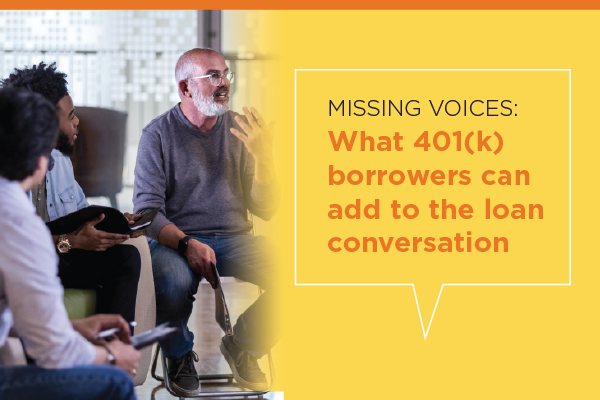Important Research Shows Participants Want Loan Default Protection
While employees appreciate being able to take 401(k) loans in case of financial emergency, the possibility of not being able to repay those loans is stressing employees out, according to a new independent study by Custodia Financial and Greenwald & Associates, a third-party market research firm with unique industry expertise in financial services, employee benefits, and healthcare.
Entitled “Missing Voices: What 401(k) Borrowers Can Add to the Loan Program Conversation,” the study found that while a vast majority of employees with 401(k) loans (91 percent) value the opportunity to borrow from their 401(k) plans, 70 percent believe that losing a job would make paying off a loan more difficult.
The majority supports the addition of automated loan insurance, well ahead of measures such as extended loan repayment programs, and believe that it would reduce their financial stress. Key findings included:
- The appeal of loan insurance: Almost 80 percent of participants find automated, low-cost loan insurance appealing; almost 60% believe their employer should add it.
- Would save more: Two-thirds (67 percent) of participants say they’d consider contributing more to the plan if their employer were to add loan insurance.
- Stress reducing: Seventy percent of the participants report being financially stressed. Of those who are financially stressed, more than 80 percent say loan insurance would reduce that stress.
“The survey data and interviews with participants clearly show that 401(k) borrowers are under a great deal of financial stress,” says Brian Perlman, SVP and Financial Service Practice Lead for Greenwald & Associates, who led the research. “The implication for plan sponsors is to find a more effective way to protect their participants’ retirement accounts from loan defaults and cash outs.”
“Missing Voices” in the News…
- “401(k) loan benefits are stressing employees out,” Employee Benefits News
- “Participant Views on Retirement Plan Loans Can Inform Benefit Decisions,” PLANSPONSOR
- “Threat of defaulting on 401(k) loans haunts employees,” BenefitsPRO
Listen to the “Voice of the Participant”
Hear the “voice of the participant” first-hand by listening to the audio clips below, recorded during the in-depth interviews. See page 12 of the report for more information about these individuals’ situations. Names are for illustrative purposes only to protect anonymity, but these are recordings of actual participants in the study.

